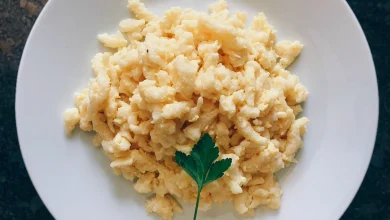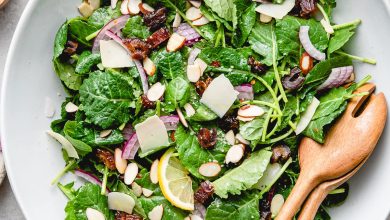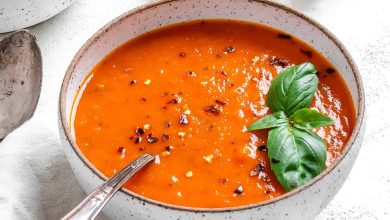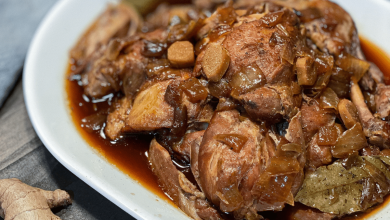Apricot Mustard
🍑🍯 Apricot Mustard: A Delightful Condiment 🍑🍯
Apricot mustard is a delectable condiment that combines the sweetness of ripe apricots with the tangy kick of mustard. It’s a versatile addition to your culinary repertoire, perfect for dipping, glazing, or spreading on various dishes. Let’s dive into its history, components, preparation steps, and required time.
📜 History:
Apricot mustard has a rich history that traces back to the Middle Ages. It was often used in medieval European cuisine as a way to add flavor to meats, particularly game meats. Over time, the combination of apricots and mustard evolved, leading to the creation of this delightful condiment we enjoy today.
🥭 Components:
To make apricot mustard, you’ll need the following ingredients:
- Ripe apricots (fresh or canned)
- Mustard seeds or Dijon mustard
- Sugar or honey (for sweetness)
- Vinegar (for tanginess)
- Spices (optional, for added flavor)
👨🍳 Steps to Prepare Apricot Mustard:
Here’s a step-by-step guide to creating your own homemade apricot mustard:
-
Prepare the Apricots: If using fresh apricots, wash, pit, and chop them into small pieces. If using canned apricots, drain them.
-
Blend or Mash: Place the apricots in a blender or food processor and blend until you have a smooth puree. Alternatively, you can mash them with a fork for a chunkier texture.
-
Combine with Mustard: In a saucepan, mix the apricot puree with either mustard seeds (if you want a whole-grain texture) or Dijon mustard (for a smoother consistency).
-
Add Sweetener: Incorporate sugar or honey to taste. The amount will depend on your preference for sweetness. Start with a small amount and adjust as needed.
-
Introduce Vinegar: Pour in vinegar to add the desired tanginess. White wine vinegar or apple cider vinegar work well. Again, adjust the quantity to your taste.
-
Spices (Optional): If you’d like to enhance the flavor, consider adding spices such as ginger, cloves, or cinnamon. These can elevate the complexity of your apricot mustard.
-
Cook and Simmer: Place the saucepan over low heat and simmer the mixture, stirring frequently. This will help meld the flavors and thicken the mustard. The cooking time can vary but typically takes around 20-30 minutes.
-
Cool and Store: Once your apricot mustard has reached the desired consistency, remove it from the heat and let it cool. Transfer it to a clean, airtight container and store it in the refrigerator.
🕒 Preparation Time:
The preparation time for apricot mustard depends on factors like the quantity you’re making and your cooking skills. On average, it takes about 45 minutes to an hour, including preparation and cooking time. However, the mustard can be used immediately after preparation if you’re in a hurry, though it may benefit from some time to meld flavors in the refrigerator.
🍑🍯 Apricot mustard is a wonderful fusion of sweet and savory flavors that can enhance a wide range of dishes, from grilled meats to sandwiches and cheese platters. Enjoy experimenting with this versatile condiment in your kitchen! 🍑🍯😊
Certainly! Here are the nutrition facts and some health information for apricot mustard:
Nutrition Facts (per serving, approximately 1 tablespoon):
- Calories: Approximately 20-30 kcal
- Total Fat: Negligible
- Sodium: Varies depending on mustard used
- Total Carbohydrates: Approximately 5-7 grams
- Dietary Fiber: 0-1 gram
- Sugars: 4-6 grams (from apricots and added sweeteners)
- Protein: Negligible
Health Information:
-
Low in Calories: Apricot mustard is relatively low in calories, making it a suitable condiment for those looking to manage their calorie intake.
-
Low in Fat: It is typically low in fat, making it a healthier alternative to some other condiments that may be higher in fat content.
-
Moderate Sugar Content: The sugar content primarily comes from the apricots and any added sweeteners. While it does contain sugar, it is typically not excessively high.
-
Source of Vitamins and Antioxidants: Apricots are a good source of vitamins like vitamin A and vitamin C, as well as antioxidants that can be beneficial for your health.
-
Fiber: Depending on the recipe and the use of whole apricots, there may be a small amount of dietary fiber in apricot mustard. Fiber is essential for digestive health.
-
Low Sodium Option: The sodium content can vary depending on the type of mustard used. Opting for low-sodium mustard can help keep your sodium intake in check.
-
Versatile Use: While apricot mustard can be enjoyed in moderation, it can add a burst of flavor to your meals. It can be used as a dipping sauce, glaze, or spread, allowing you to incorporate it into a variety of dishes.
Remember that the nutrition facts may vary slightly based on the specific ingredients and proportions used in your homemade apricot mustard. As with any condiment, moderation is key to maintaining a balanced diet.








